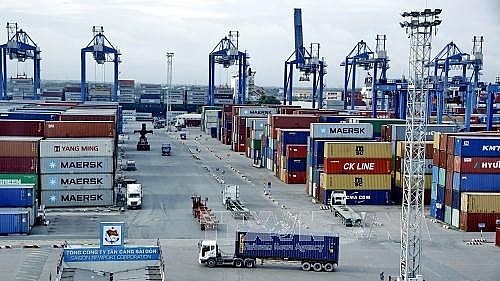Renovation needed for logistics industry to thrive: insiders
HCM City – The Vietnamese logistics sector is eyeing the urgent need for renovation, overall solutions and vision as well as new development orientations to catch up with the global trend, creating a breakthrough for the country’s socio-economic recovery and development, according to experts.
 |
| Illustrative image (Source; VNA) |
Vietnam ranks 11th out of the 50 countries in the 2022 Emerging Market Logistics Index released by logistics and freight provider Agility.
The country’s freight and logistics market is expected to grow at a compounded annual growth rate of 5.5 percent in 2022 – 2027. Its economy has posted a strong recovery this year, growing at 8.93 percent in the first nine months.
Vietnam’s foreign trade was worth 557 billion USD in the period, representing a large freight and logistics market.
However, Le Thi Ngoc Diep, Director for Trade of SLP Vietnam, said that the standards of the storage and warehouse system have remained modest, while many logistics firms have yet to be able to join the global supply chain.
Meanwhile, the demand for a modern logistics system that combines automation and meets the growth of retailers and the e-commerce industry in Vietnam is very high.
This requires the logistics industry in Vietnam to change and transform in an irreversible trend with the investment in modern warehouse infrastructure, applying digital and automatic management and more professional governance model, she said.
A young and growing population of around 100 million people, stable and supportive Government policies, extensive trade agreements with other countries, and favourable trends in manufacturing, exports and domestic consumption are driving logistics services, Chih Cheung, founding managing partner at SLP Vietnam, said.
But at the same time, there were a lot of inefficiencies in the industry, he said, adding that logistics costs represent 20 percent of GDP in Vietnam while it is 7-9 percent in mature markets.
Speaking at the Vietnam Logistics Transformation forum held in HCM City recently, Hoang Quang Phong, Vice President of the Vietnam Chamber of Commerce and Industry (VCCI), proposed the setting up of an inter-sectoral working group between the Ministry of Transport and the Ministry of Industry and Trade to review and remove difficulties and support the logistics industry by proposing policies and solutions to serve the development of projects to promote Vietnam's economic growth in the context of escalating logistics costs and shortages in serious containers in 2021.
Dao Trong Khoa, deputy chairman of the Vietnam Logistics Business Association, said the logistics industry is benefiting from free trade agreements and the rapid growth of e-commerce.
E-Logistics has leveraged the efficiency of logistics services, he said.
However, the country’s logistics landscape is still fragmented and a master plan to attract investment and develop infrastructure to fully tap its potential is urgently needed, he said.
Most of domestic businesses are small- or medium-sized with limited capital, technology and automation, and face fierce competition from foreign companies.
They only have a 30 percent market share, with the remaining 70 percent held by foreign businesses, he said.
But domestic businesses are increasingly investing in infrastructure, modern warehousing and technology to increase their market share, he added.
 | Vietnam utilising its advantages of logistics to aid supply chain advances Vietnam’s logistics system remains less competitive than some neighbouring countries. Marco Civardi, CEO of JAS China , a privately-owned international freight forwarder, gave VIR’s Bich Ngoc his assessment of the shifting of manufacturers to Vietnam and how the country is positioning itself to be more integrated into the global supply chain. |
 | Digital Transformation in logistics opens new perspective for Vietnamese businesses The seminar with the topic Digital Transformation in Logistics – Actual Situation of Logistics Operation and Successful Digital Transformation Story in Vietnam in Ho Chi Minh City on October 18 brought about experiences for Vietnamese enterprises. |
What the stars mean:
★ Poor ★ ★ Promising ★★★ Good ★★★★ Very good ★★★★★ Exceptional
Related Contents
Latest News
More News
- Citi economists project robust Vietnam economic growth in 2026 (February 14, 2026 | 18:00)
- Sustaining high growth must be balanced in stable manner (February 14, 2026 | 09:00)
- From 5G to 6G: how AI is shaping Vietnam’s path to digital leadership (February 13, 2026 | 10:59)
- Cooperation must align with Vietnam’s long-term ambitions (February 13, 2026 | 09:00)
- Need-to-know aspects ahead of AI law (February 13, 2026 | 08:00)
- Legalities to early operations for Vietnam’s IFC (February 11, 2026 | 12:17)
- Foreign-language trademarks gain traction in Vietnam (February 06, 2026 | 09:26)
- Offshore structuring and the Singapore holding route (February 02, 2026 | 10:39)
- Vietnam enters new development era: Russian scholar (January 25, 2026 | 10:08)
- 14th National Party Congress marks new era, expands Vietnam’s global role: Australian scholar (January 25, 2026 | 09:54)

 Tag:
Tag:



















 Mobile Version
Mobile Version